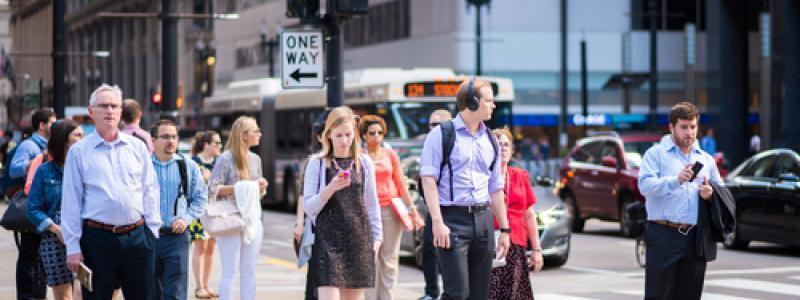Chicago is Proposing A Fine Of Up To $500 For People Texting At Crosswalks

As reported by CBS Chicago, two council members in the city of Chicago, Anthony Beale and Edward Burke, are proposing a law that would impose a fine on mobile users who are caught text messaging while traversing crosswalks. If passed, this ordinance would mirror that of the city of Honolulu -- some may remember that back in July earlier this year, the capital of Hawaii become the first major city in the America to outright ban mobile use at crosswalks. But whereas Honolulu’s fine can range from only $15 to less than a hundred bucks, the Windy City is considering charging at least $90 and up to $500.
Just about everybody knows this, but we tend to take things for granted anyway -- we need to be less absorbed with looking at our smartphone display screens while walking in the street, even more so when we are crossing to the other side of the road. While it is true that it is somewhat tricky to accurately quantify how many people get hurt (or worse) because of too much text messaging at crosswalks, it bears noting that according to the Governors Highway Safety Association, the total number of pedestrian deaths has risen by 11 percent last year. And the GHSA has particularly cited mobile use (by both pedestrians and drivers of vehicles) as an contributing factor.
The bottom line is -- we all need to be careful. But is imposing a fine of $90 to $500 the correct way to compel us to exercise more caution? The thing is -- nobody knows exactly just yet if this fine based system will work. And then there is the enforcement aspect of it -- is there a different criteria to consider when it comes to fining texters as opposed to those who are talking on their mobile devices. One can argue that when you are taking a phone call, you can still see where you are going, even if you are still a bit distracted. How about specific scenarios such as checking Google Maps to see if you are in the right location? Or what about tourists who just want to take some photographic evidence that they have visited Michigan Avenue?
No doubt about it -- these will be the sort of questions that Chicago will have to go over if they decide to pass the proposed ordinance. But if the ultimate objective is to keep the city’s mobile users (and visitors) safe in the streets, then just maybe, the fear of paying five hundred bucks will do the trick.
Related Blog Articles
- Face ID Reportedly Got Hacked
- Apple Watch Leads Global Shipments of Wearable Devices
- Are We Getting Better At Dealing With Our Mobile Device Addiction?
- FCC Okays New Rules for Combatting Robocalls
- Garmin Incorporates Mobile Payment System into its Wearables
- AT&T to Fight DOJ’s Move to Block Carrier’s Acquisition of Time Warner
- FCC Bares Proposal to Overhaul 2015 Net Neutrality Rules
- So What Are The Big Four Carriers Offering This Black Friday?
- AT&T Extends Deadline of Time Warner Acquisition to April
- Report: Pace of Phablet Growth to Hit 18.1 Percent by 2021
Related Blog Posts
- Report: Drug users are using wearable devices during binges
- Spotify allows Android users to reorder playlists; Pandora lets users share tunes to Snapchat Stories
- WhatsApp combats fake news with a new forwarded label
- FCC: Today’s improving mobile networks can impact healthcare costs
- Did Apple Music already overtake Spotify in America?


 Menu
Menu